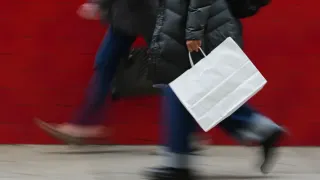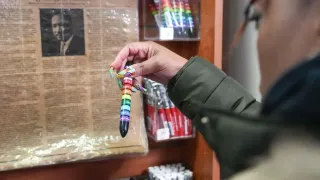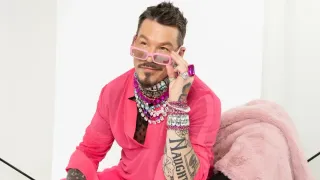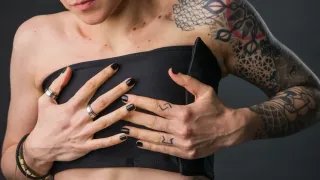July 16, 2016
LGBTs Debate Gun Laws
Seth Hemmelgarn READ TIME: 4 MIN.
As the U.S. reels from recent gun violence that includes the massacre at the gay Pulse nightclub in Orlando, Florida; the fatal police shootings of two African-American men in Louisiana and Minnesota; and the ambush killings of five Dallas police officers, California officials are taking a look at the state's gun laws while LGBT firearms enthusiasts say additional legislation is unnecessary.
Governor Jerry Brown recently signed into law a package of bills meant to enhance gun safety. While he vetoed several other pieces of legislation, a state LGBT advocate called the bills that he signed "significant."
Brown signed six gun safety bills July 1. Among other provisions, the new laws prohibit people from possessing high capacity assault rifle magazines, regulate ammunition possession and sales, and expand background checks.
The statewide LGBT lobbying group Equality California was joined by 19 other LGBT and HIV-related organizations in backing the bills as part of EQCA's Safe and Equal campaign against gun violence.
"The bills signed into law today are a historic step in keeping Californians safe from gun violence," Rick Zbur, EQCA's executive director, said in a July 1 news release.
Zbur thanked Brown, Senate President Pro Tem Kevin de Le-n (D-Los Angeles), Assembly Speaker Anthony Rendon (D-Paramount) and others "for maintaining California's leadership in enacting tough, commonsense laws that protect all of us."
As Zbur noted, Brown vetoed several gun safety-related bills, including those that would've allowed people to buy only one long gun per month and expanded who could request a restraining order to prevent high-risk individuals from getting a firearm.
In his veto message on that legislation, Assemblyman Phil Ting's (D-San Francisco) Assembly Bill 2607, Brown noted a restraining order bill that he had signed just took effect in January, "so at this point it would be premature to enact a further expansion."
Zbur said Brown's "veto messages reflected careful analysis and raised concerns that we believe can be addressed. We continue to believe that these bills included important protections to strengthen California's gun laws. We encourage legislators to work with the governor next year to address his concerns and close remaining loopholes in California law."
In an interview, Zbur said EQCA is supporting national efforts to tighten gun laws.
"We've been communicating with the Democratic leadership and members of Congress, particularly in the California delegation, to try to put together coordinated efforts with gun safety groups and members of organizations representing communities of color that have been heavily impacted by gun violence, just like the LGBT community," he said.
He said his group would also focus on lawmakers from California, particularly Republicans, who've voted "the wrong way" on gun safety or who've been "part of the deadlock in Congress, where they won't bring gun safety bills to a vote."
Now that several of the gun bills it supported have been signed into law, EQCA is also looking at endorsing Lieutenant Governor Gavin Newsom's Proposition 63, also known as the Safety for All initiative, which is set to be on the state ballot in November.
Among other provisions, it would prohibit possession of large-capacity ammunition magazines and strengthen and require most people to pass background checks and get authorization from the Department of Justice to buy ammunition.
Zbur said EQCA is "generally going to be supporting everything that will have an impact on ending gun violence in California and across the country."
Not everyone supports the efforts to tighten gun laws, however.
Pink Pistols
Dave Truslow, who's with the San Jose chapter of the Pink Pistols, a group of LGBT gun enthusiasts, said in an email to the Bay Area Reporter that his group's reaction to the new California laws "is the same as other firearms enthusiasts: Enforce existing laws and enact laws that reduce crime - not criminalize law-abiding citizens. None of the bills Governor Brown vetoed or signed will make any impact on crime or violence. Criminals don't obey laws. None of the bills sent to Governor Brown have improved public safety elsewhere. There's no reason to expect they will here."
Truslow said the Legislature should instead "reinstate gun theft as a felony with a mandatory 10-year minimum sentence" and ensure criminal prosecution of people who enable illegal transfers of firearms, among other measures.
"I'm disappointed and perplexed by LGBT organizations such as EQCA that urge more gun control but fail to improve community safety," he said. "By contrast, San Jose Pink Pistols instructors are eager to conduct [Refuse To Be A Victim] safety courses to Bay Area LGBT groups. We teach tips and techniques versus urging authorities to disarm you."
Nicki Stallard, a trans woman who runs the San Jose Pink Pistols and acts as a spokeswoman for the national group, has gained some attention for her criticism of Newsom's proposal.
"Firearms policies should be aimed at criminals," Stallard said in an interview. "Gavin Newsom's policies will do nothing to disarm criminals. What they will do is disarm potential victims" and "chill the rights of California gun owners on many levels."
Stallard said that there are about 315 members in her meet-up group, and that the Alameda and San Francisco Pink Pistols chapters probably have 50 to 100 members between them. Nationwide, she said there's been "explosive" growth in the Pink Pistols but said the group doesn't keep "tight" records to protect members' privacy.
Zbur, referencing the National Rifle Association, said that Truslow's reaction that instead of pushing new bills, legislators should enforce existing laws reflects "the typical NRA mantra. We know how well that's worked."
He added there's been widespread support for his group's efforts on gun safety.
"Of the things that we have been working on, the thing I have received the most support from within the LGBT community and people thanking us is that we stepped up so quickly and elevated the issue," Zbur said, adding that people have approached him in the street, in clubs, and at Pride events.
Because of the "overwhelming support," Zbur said, "we know that this is the right thing to do, not only for LGBT people, but for California and the American public in general."






